
|

|
|
|
|
|
|
|
|
| ||||||||||||||||||||||||||||||||||||||||||||||||||||||||||||||||||||||||||||||||||||||||
|
The trouble began in January 2002, when Yolanda, caught in a myriad of teenage problems, was receiving counseling at her school. The counseling did not help, but rather left her further confused and she grew desperate enough to stage a “cry for help” by swallowing 13 aspirin. When she told her school counselor a week later, the counselor’s response was that Yolanda must be “chemically imbalanced.” At the counselor’s request, Maria said, she took her daughter to a university medical center, where a psychiatrist briefly interviewed the girl, and confirmed that, yes, Yolanda was chemically imbalanced. Little did Maria know, but she had just fallen into the same trap so many parents and patients had before her, because that psychiatrist had just made a “professional diagnosis” with no basis in fact — no lab test or other medical evidence. But the remedy? A prescription for Zoloft. When Maria asked if there were any side effects from the drug, the psychiatrist told her, “Only minor, if any.” After six days on Zoloft, Maria said, Yolanda started having severe headaches, followed by diarrhea. Then blood appeared in her feces. Maria called the psychiatrist, who told her that the headaches and diarrhea were side effects but that the blood in the feces was not. She recommended that Maria stop the drug regardless but, Maria said, gave no warning of any dire consequences that might result from abruptly discontinuing it. Maria stopped giving her daughter the drug on March 11. She says that Yolanda quickly became extremely agitated, as she had never been before the drug. Three days later, Yolanda scratched at her wrist with a needle; on March 18, she went to the school counselor feeling very nervous and upset. Yolanda was shortly thereafter committed to a local hospital for 72 hours of observation. The hospital sought Maria’s permission to drug Yolanda; she refused, as drugging had only made her daughter far worse. The following day, a psychiatrist called Maria and told her that Yolanda had scratched her face and was in desperate need of medication. Maria explained her concern about her daughter’s health. The psychiatrist, Maria said, did not seem concerned — but told Maria she would be guilty of medical neglect if she would not allow her daughter to be drugged again.
“I insisted that I wanted Yolanda to be given a thorough physical examination by our family physician, and [the psychiatrist] insisted that the hospital’s doctor had already examined her and everything was fine. “Why, then, would Yolanda need to be medicated if everything was fine?” Maria said. When Maria asked to see the records of this latest examination, she was assured she would be able to see them when she went to visit her daughter. Yet when she arrived at the hospital, she found first that Yolanda did not have any scratches on her face at all, and second that the hospital would not release the medical records to her. That same day, Maria learned, the psychiatrist called Child Protective Services to complain that she was “medically neglecting” her daughter. As a result, a social worker visited Maria and her other children in their home. The worker questioned the children about life at home, and Maria about Yolanda. Maria explained why she was opposing medication — it hurt Yolanda, she said, and she trusted none of the drugs. Again, she was told she was “medically neglecting” her daughter. Maria didn’t know what to expect next, but she knew she had to get her daughter to safety. She filed a formal letter of complaint to the hospital’s program director and administrator, charging that the psychiatrist had lied about the severity of Yolanda’s condition. On March 25, the hospital released Yolanda back into her mother’s custody. Maria was very relieved to be reunited with Yolanda, but in the interest of the girl’s safety, she sent her to stay with relatives out of town — rather than risk that she be taken away from her and drugged. Her daughter, she said, is now doing fine. “Special Attention” Stories like that of the Mendezes are becoming commonplace: well-meaning parents pitted against a system where schools, mental health facilities and at times Child Protective Services force the drugging of their children.
Within days, the school set an appointment for Veronica to meet with the principal, teacher and school psychologist. At the meeting, the teacher asserted her assessment of Steven, saying he would need medicine to “focus” better and would need to go to another school. Veronica was given an “Evaluation Plan” to authorize these actions. "I signed it so that they could evaluate my son,” she said. “I also agreed in writing to have him change schools. When I signed this I had no idea I would cause my son so much harm.” Veronica said the school then referred her to a community mental health center where a psychiatrist told her that, based on the evaluation from the school, her son’s reported behavior indicated he needed medicine to become well and calmer. He prescribed Steven the amphetamine-type drug Ritalin, 5 mg twice per day. Steven also started at his new, special education school in Culver City. Veronica would give her son a pill in the morning, and the school gave him the other one in the afternoon. Soon she noticed that Steven was changing. "He would get angry very easily, for any reason; he seemed nervous, he didn’t eat well, he had insomnia,” she said. “I also noticed that he wasn’t learning anything in school. He couldn’t read, but at the center they told me my son was doing fine and that he was learning. My son always had a very good report, but I didn’t understand why because he couldn’t even read or write.” When Steven was 9, the psychiatrist doubled the dose of the drug. "When my son started taking this amount of Ritalin, I could see he had bags under his eyes, his lips were purple, he was very quiet, like a zombie,” Veronica said. “He didn’t want to eat; he would start being hungry at seven o’clock. At night he had insomnia.” When Veronica, now very alarmed, decided to discontinue the treatment for her son, both the clinic and the school center insisted she reconsider, saying the drug was helping him “to be more quiet and attentive,” she said. She refused. The school’s staff also had the telephone number of Steven’s father, she said, and someone called him to convince him to have his son continue the drug. Steven’s father went to the Center where he made clear that he would not allow them to give his son the drug, and that if they continued to give it to him or to bother the family, he would sue them. He took Steven out of the school. "Since then, he has been going to a private school,” said Veronica. “Now he looks fine. He is advancing a lot in school, he knows how to read well. They have helped him a lot, without drugs. "My son didn’t need the special education, that only caused him to fall behind, or the Ritalin. In the eight months in which he has attended his new private school, he has advanced more than in the three years he was receiving ‘special education’ and drugs.” Medical Neglect At the core of the controversy over drugging school children like Yolanda and Steven lie psychiatric diagnoses which have never been proven to exist. As child neurologist Dr. Fred Baughman, one of the most outspoken critics of the practice, says, the disorders are a “fraud”. “There is no medical proof, no lab test, no ‘brain chemistry’ analysis, that shows these disorders exist,” he said. Rather, parents and teachers are just told their children have a “chemical imbalance” and need a “medicine.” As found in the extensive research of Citizens Commission on Human Rights (CCHR), in the vast majority of cases, no searching medical assessment is done of the child to determine causes for persistent poor behavior, lack of attention, agitation or other conditions. Child specialists have repeatedly cleared up such problems by isolating food allergies and environmental causes, even excessive viewing of television; in other cases, underlying causes trace to untreated pathological conditions.
Miriam said that in January 1998, however, the girl’s third grade teacher at her elementary school in Los Angeles told Miriam that her child wasn’t paying attention in class or listening to the teacher, and that she didn’t want to work. She said Miriam would have to take her daughter to the doctor for medication. The girl’s neurologist prescribed Ritalin, then discontinued it after a followup examination, finding the drug unnecessary. The school, however, soon was complaining again, telling Miriam her daughter was “regressing” because she didn’t pay attention in class. They referred her to another psychiatrist, who then prescribed double the dose of Ritalin. Miriam noticed her daughter reacting poorly after starting on the drug again. "She became quieter, sillier, and when I talked to her she wouldn’t listen. It seemed she was somewhere else. She also seemed very sad, and she had insomnia. She lost weight, she didn’t want to eat,” she said. “I also noticed my daughter wasn’t learning anything. It was like she wasn’t attending school. Yet the reason my daughter goes to school is to learn.” A year later, a new psychiatrist changed her daughter’s prescription to another drug — Aderall. Miriam noticed a bigger change. “She was even quieter now, almost dopey, and nervous,” she said. Several months later, Miriam said, the psychiatrist told her he had a report from the school that her daughter was not focusing in class and seemed very distracted. He doubled the dose of the drug. "My daughter became much more nervous, had insomnia, didn’t eat well. She was still not learning anything in school, her grades were very low,” Miriam said. “The school said that either I wasn’t giving her the drug, or the dose wasn’t high enough — that was their answer for why my daughter wasn’t paying attention in class. "I thought she was acting the way she was because of the drug. She’d act like a drug addict who needs more drugs,” Miriam said. “The school continued to think I wasn’t giving it to her.” By now, her daughter was also obsessively chewing at her cuticles. In January 2001, a social worker showed up at the Reyes’ house, due to a report that Miriam was being negligent in giving her daughter the drug. The worker told Miriam to take her daughter to a clinic for a blood test so the school could determine if she was in fact giving her daughter the drug. "I had a lot of pressure from the school,” she said. “Each time the phone rang, I was scared because I didn’t know who it was or what they were going to come up with next. I was very scared of losing my daughter.” So Miriam took her daughter to a clinic for the blood test, but also to have her examined for a bad cough. The doctor would not administer the blood test — he did not want her on Ritalin as she was too sick. He called the school himself to inform them. Several days later, her daughter’s cough was persisting, and she exhibited signs of asthma. Miriam took her back to the clinic. This time, the school sent a representative with her. "I felt very pressured, as if I was doing something bad to my daughter and they had to protect her,” she said. The doctor examined Miriam’s daughter and confirmed she had asthma. He also explained that asthma can produce nervous reactions, like some of those the girl was exhibiting. The doctor prescribed asthma medication and told Miriam to stop the Aderall, as the two drugs together would be too much for her system. Miriam was unprepared for what would happen next. Two days after stopping the Aderall, she said, her daughter became hysterical, exhibiting withdrawal symptoms. "She yelled a lot, became very rude and even more nervous. She asked me for her Aderall. I told her she didn’t need any medicine to feel good, but she acted like a drug addict, wanting more,” she said. Once through the withdrawl stage, her daughter finally calmed down. Several weeks later, the doctor confirmed that the girl’s underlying problem was the asthma condition, and she had no reason to be on any psychiatric drug. "She has not been on psychiatric medication since and she is doing fine,” said Miriam.
Cassandra Aeurbach, spokesperson for the Los Angeles chapter of the Citizens Commission on Human Rights, a world-renowned watchdog of the psychiatric industry established by the Church of Scientology in 1969, said that many cases show the real medical neglect “is in the hands of those who pressure parents to put their children on potent, harmful drugs to force them into ‘being good’. "It’s a fraud and neglect of unbelievable proportions,” Auerbach said. She said that over the past two and a half decades, common childhood behaviors have been reclassified as mental illnesses with names like “opposition defiant disorder,” “mathematics disorder,” “disorder of written expression” and “attention deficit hyperactivity disorder (ADHD)” — and drugs are the “treatment.” The industry, including drug manufacturers, jumped onto this trend in labeling and drugging children beginning in the early 1980s. Everyone wanted a piece of the profits to be had. Before long, a million children were prescribed drugs; that number has since increased ten-fold. Industry marketing made sure that “ADD” and “ADHD” became household words, along with the notion of “chemical imbalance” — for which there is absolutely no lab test or proof. They vigorously and relentlessly marketed these conditions to family doctors, but also to parents, banking on the natural concern to do what’s best for a child, and educators — giving them a new answer for those problem students who just can’t seem to perform well in the modern education system. Financial incentives were also thrown after schools — thousands more in funding for each “special education” child. "Before long, the public school system bought into this scheme. So the people that parents rely on most for their children’s health and education — their doctors and their schools — are telling them that this is what they should do. As a result, millions of kids around the country today are diagnosed with mental conditions and being drugged,” Auerbach said. “It’s been a boon to drug profits. Until a couple of decades ago, children were a virtually untapped market.” The numbers of parents like Maria Mendez, Veronica Landeros and Miriam Reyes, who are bucking the system to protect their children, are growing. Legislation has also been passed in eight states so far to, among other things, curb the practice of schools serving as mental health referral centers instead of education centers. One of the most compelling reasons for the legislation, aside from harm caused by drugs, is that two decades of drugging children has not improved education levels. "A growing number of people see that it has simply gone too far,” said Auerbach. “Fraud can only be committed on the public for so long before people catch on. The question is, how many more kids have to be harmed before we as a society lower the boom on this destruction.” * Names in this story have been changed to protect the privacy of the children and their families.
|
|
|
|
|
|
|
|
|
|
|
|
|
| Previous | Scientology Glossary | Contents | Next | |
| Your view | Scientology Related Sites | Bookstore | Church of Scientology Freedom Magazine |
|
|
|
|
|
|||||||||||||||||||||||||||||||||||||||||||||||||||||||||||||||||||||
Supported Sites
Scientology Groups · Reviews for "The Church of Scientology" · Scientology: The Doctrine of Clarity · Religious Tolerance: Scientology · Description of the Scientology Religion · Scientology (CESNUR) · Scientology · Scientology Handbook · Scientology Religion · What is Scientology?

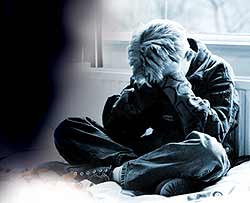

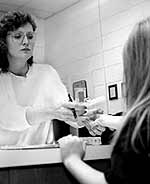
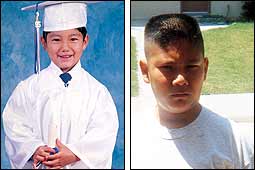
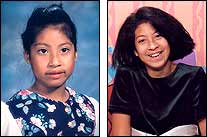
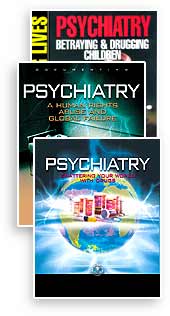 Harm & Fraud in the Name of Help
Harm & Fraud in the Name of Help